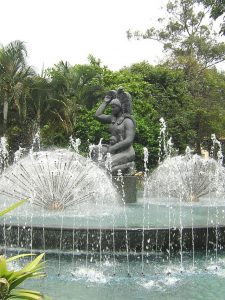
A representation of Bachué in a local fountain.
Bachué is the mother goddess and master of the Muisca or Chibcha culture, an ancient Colombian civilisation. They were native to the area now known as Bogotá, and gained fame as the origin of the El Dorado legend. Bachué was believed to have emerged from the waters of the Iguaque Lake surrounded by light, holding a three-year-old baby in her arms. They walked to the plains surrounding the lake and built a hut, which was then considered to be the first Chibcha dwelling. Following this, her centre of worship became a temple in the San Pedro de Iguaque area.
In the years that followed, her baby grew into a man and the two married. As the mother deity, Bachué was extremely fertile. Each time she became pregnant she bore 4 to 6 children, and would leave them in different regions of Colombia as they travelled the country in order to populate the towns and cities. Bachué taught her children how to farm the land and make clay pots, while their father taught them how to fight and educated them on the values of life. Once enough of their children had been established, Bachué decided the Muisca had been colonised enough, so they planned to return to the Iguaque Lake. They gathered all their children to preach about the importance of peace, before swimming into the lake and disappearing. They soon transformed into snakes to show that their children would never truly be alone, and would always receive their support should they be needed.
The Iguaque Lake became an important shrine to Bachué, and was used for both ceremonies and rituals in her honour. Many members of the Muisca civilisation went on pilgrimages to its shores, carrying offerings to appease her. Two small huts were built: one dedicated to Bachué, and the other to her husband. In his was a solid gold figure of a three-year-old child, next to a golden rock that could be used to grind corn. When the Spanish reached their shores, they documented that offerings were made to this statue as well.
Following the Spanish Conquest of the Muisca civilisation in 1537, Fray Pedro Simón became the chronicler of the indigenous peoples Colombia and Venezuela. In his 1626 text Noticias historiales de las conquistas de Tierra Firme en las Indias Occidentales, or Histories of the Conquests of Tierra Firme in the West Indies, Simón listed Bachué as the main deity of Colombia. His work also references their disappearance in the lake, with reference from her returning from the underworld to guide the Muisca in their times of need.
The story of Bachué had a positive impact on Muisca culture, the effects of which can still be felt in Colombia today. The culture is matriarchal, meaning that it centres on a female as the head of the family. This is particularly highlighted in the legend, as her son/husband is never referred to by name. She alone is the deity and as such, is responsible for creating the traditions and values of the culture.
-Devon Allen
Junior Girl
Girl Museum Inc.
